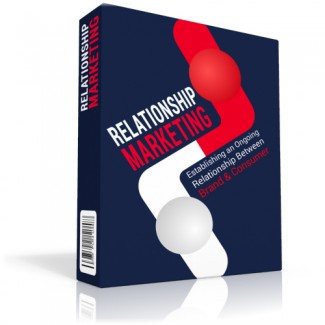 License Type: Personal Use
License Type: Personal Use  File Size: 5,428 KB
File Size: 5,428 KB File Type: ZIP
File Type: ZIP
 SKU: 54266
SKU: 54266  Shipping: Online Download
Shipping: Online Download
Ebook Sample Content Preview:
Section 3: Dealing With Customer Dissatisfaction
No matter how well you run your company, sooner or later you'll have to deal with a dissatisfied customer. While all businesses should strive to provide good customer service, it's even more important to get it right if you aspire to be successful with relatonship marketng.
The key here is to treat every complaint like an opportunity to gain a lifelong proponent of your business. This is your chance to show them how different you are from other companies, and that you actually value them as a customer. Some of the most loyal customers are those that started out on a rocky foundaton but had their issue resolved in just the right way.
Most of the advice in this secton boils down to the fundamentals discussed earlier: actng less like a company and more like a person, while staying honest, open and respectful.
Respond quickly
An angry customer often has very little patence to sit around waitng for a response. They want their problem resolved, and they want you to make it your highest priority!
Being quick to respond is especially important if a customer is complaining openly on social media, as it may otherwise snowball into a huge mess that's very difficult to get out of. Just one customer with a large following on Twitter can cause a lot of damage to your brand unless you take the complaint seriously.
Also, nothing will impress a customer more than answering an e-mail or Twitter complaint within minutes. If you don't get a lot of complaints, try to keep your inbox open throughout the day and address complaints as soon as they arrive.
If possible, handle the issue yourself
Coming back to the relationship marketing fundamental of acting as a relatable person instead of a faceless corporation, you should whenever possible deal with the most difficult customers personally.
This serves two purposes:
It lets the customer know that you are taking his/her complaint very seriously
It gives you complete control over the process, leaving less room for poor handling of the complaint
Think about the last time you had to contact the customer service at a large company. How would you react if the CEO personally reached out to you, promising to resolve the issue to your satisfaction? You'd probably feel like you're important to them, and that they care about keeping you as customer.
Of course, in a large corporation the CEO can't be expected to step in and deal with every little issue, but taking an hour a day to deal with the loudest, most pressing complaints may be time well spent.
Leave your personal feelings out of it
This almost goes without saying, but you absolutely must not take any complaints personally. Even if the complaint is about your own job performance. If you can't remove your feelings completely from the situation, you risk making it worse with your involvement. Remember that it's (hopefully) not you as a person they're dissatisfied with, but rather the situation as a whole.
Even if you find the complaint to be invalid, it's important to still acknowledge the feelings of your customer. Maybe he or she is having a terrible day in general, and the tiny issue they're having with your product or service now represents everything they're angry about in their lives. If you can turn this into a positive experience for them, perhaps brighten their day a little, you may find yourself with a lifelong customer.
Stay honest and own up to mistakes
While some issues that arise may be due to circumstances out of your control, mistakes do happen and it's important to be able to admit when something is your fault.
This is another rela&onship marke&ng fundamental that we're coming back to. A company that is successful with rela&onship marke&ng is one that is transparent and honest with their customers. Making mistakes is human, and it makes your company all the more relatable if you can admit when you've made one.
Even if something really isn't your fault, it's important to let the customer know that you will do what you can to resolve it.
A great example is an online store, when a package is lost on its way to a customer. Technically, this is probably not your fault. But the customer doesn't care whose fault it is, he or she just wants it resolved. If all you do is blame the shipping company, never offering your personal assistance to inves&gate the issue, the customer will probably lose their confidence in you and your business.
Offer compensation
In a small business, every monetary loss hurts. This is especially true when a customer demands a refund, even if they're not technically en&tled one.
What you need to consider in this situa&on is the cost of not giving them a refund. Maybe they'll never buy from you again either way, but what will they tell their friends? What will they write in their Twi;er feed?
Usually it just makes more sense to offer a refund, maybe even some extra compensa&on on top if possible, just for the peace of mind. If they s&ll go on Twi;er to spew dirt over your company, you can just let everyone know that they have been properly refunded and really have li;le reason to s&ll be angry with you.
You'll also find that some of these customers will be so impressed by your generosity, they'll not only stay loyal but also tell their friends about you. In this case, a short term loss turns into a long term gain.
- File Size:5,428 KB
- License: Personal Use
- Category:Ebooks
- Tags:2015 Ebooks Personal Use








